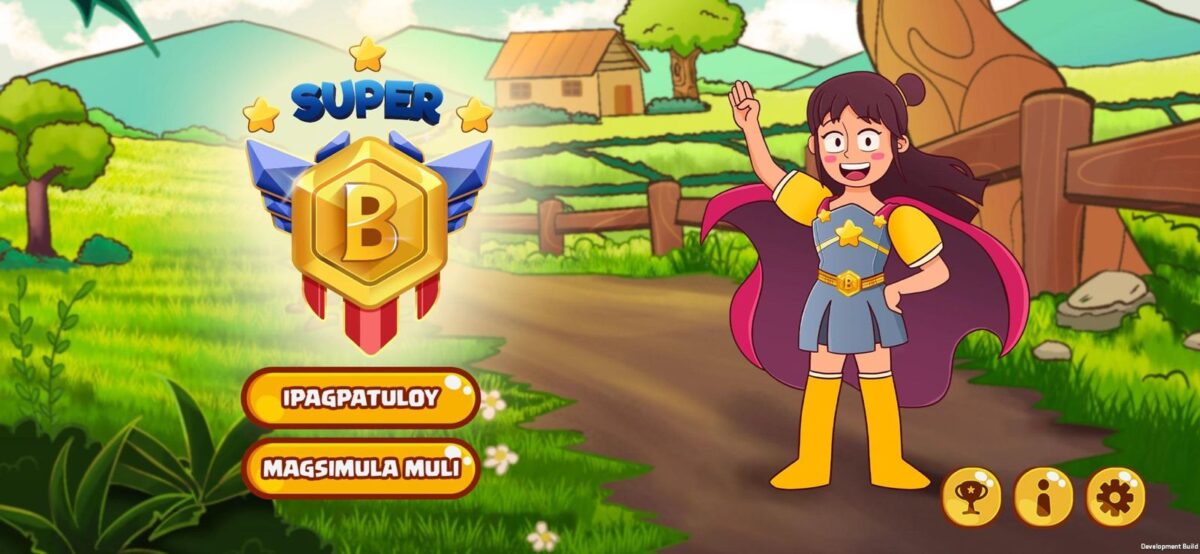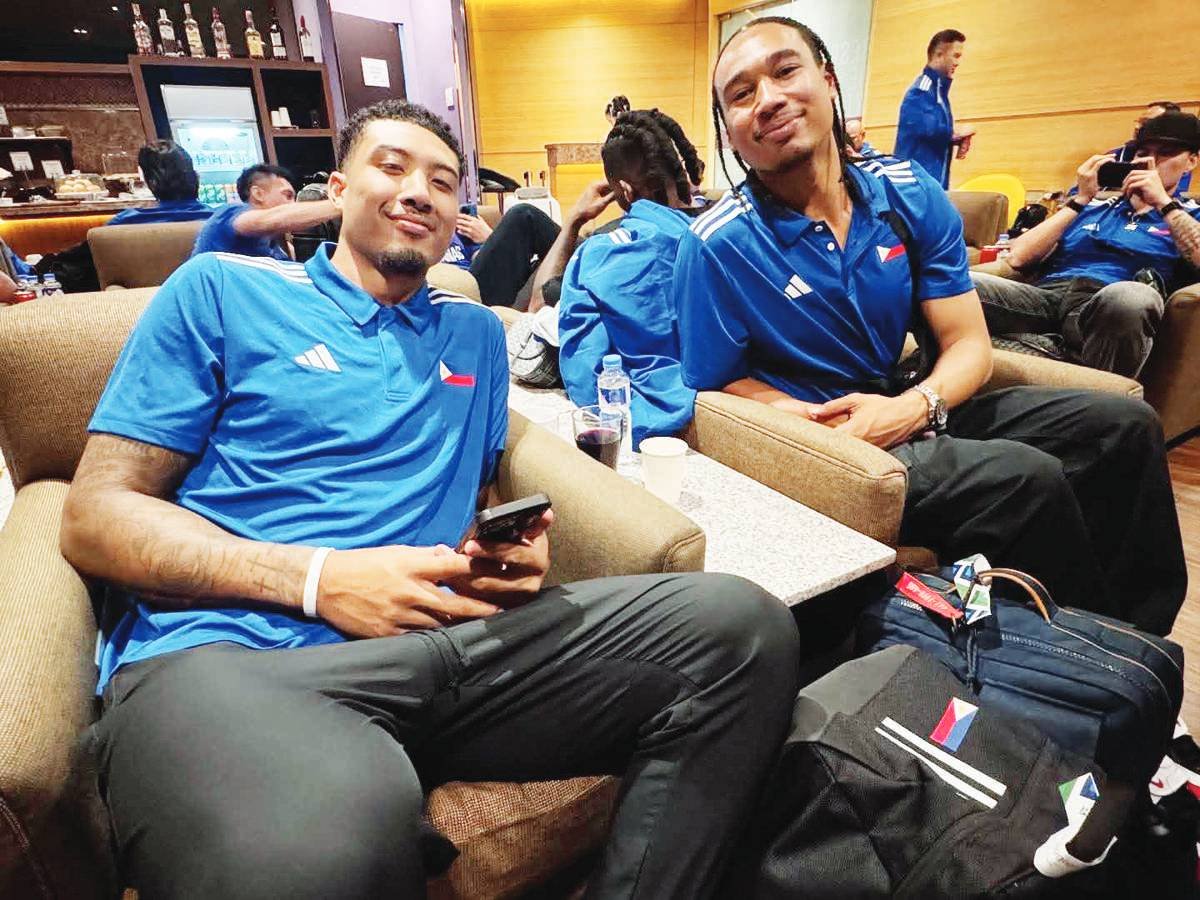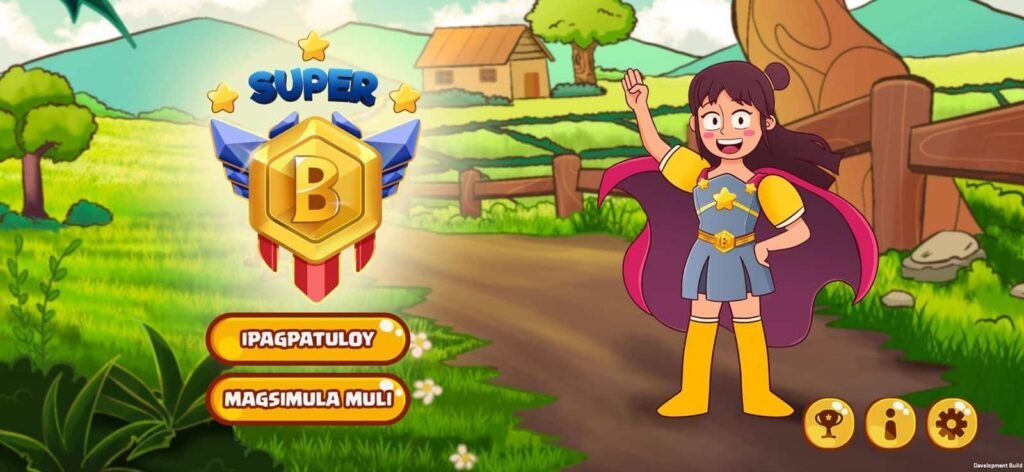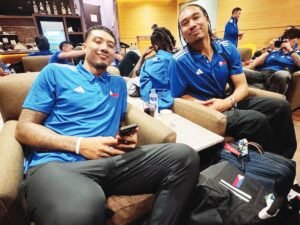
A first look at the official title screen of Super B, a groundbreaking Filipino-made game designed to empower and educate deaf and mute children through inclusive gameplay. (Photo courtesy of Franchesca Del Mundo and Rylle Jewel Villamater)
Learning can take many forms—and often, it starts by recognizing what’s missing: a gap in access, representation, or understanding. For two student game developers, this realization led to the creation of an educational adventure game for a community frequently overlooked in traditional media and classrooms.
That game is Super B, launched on July 25, 2025. It blends engaging gameplay with purposeful learning, designed specifically for persons with disabilities.
Super B is tailored for elementary students who are deaf and mute. This locally developed mobile game promotes inclusive learning through interactive challenges focused on Filipino history, featuring subtitles and the integration of Filipino Sign Language (FSL) to make lessons more accessible and engaging.
The story behind Super B
The game follows the story of a young deaf child who dreams of becoming a superhero. However, in class, that dream is dismissed and ridiculed, reflecting the discrimination many deaf children experience in real life.
Instead of giving up, the child sets out on a five-level adventure, with each stage filled with challenges rooted in Philippine history.
Along the way, players collect essential cultural items, solve matching challenges, and unlock visual lessons—all designed to reinforce historical learning in an engaging and empowering way.
The narrative echoes the real-life experiences of many children with disabilities: being misunderstood, underestimated, or excluded. But in Super B, the child becomes the hero—and so does the player.
Originally a thesis project at the Eulogio “Amang” Rodriguez Institute of Science and Technology (EARIST), fine arts students Franchesca Del Mundo and Rylle Jewel Villamater decided early on to veer away from creating tangible works, such as paintings or crafts, the usual path for their course. Instead, they chose to develop a digital game, a bold decision, especially since neither of them had programming experience.
“We wanted to stand out, and we realized there aren’t many educational mobile games, especially for deaf kids,” Villamater told the Inquirer.
Their limited programming knowledge didn’t hold them back. Instead, it fueled their determination to make a difference.
With creativity, persistence, and a clear vision, they brought Super B to life. Collaborating with computer engineering students Arianne Ignacio and Jasmine Alboleras from the Polytechnic University of the Philippines (PUP), the team blended thoughtful research with real community insights to create a game that genuinely empowers and includes.


A gameplay screenshot from the opening scene of Super B shows the animated story of Bing Bing, with Filipino Sign Language displayed on the side to assist deaf and mute learners. (Photo courtesy of Franchesca Del Mundo and Rylle Jewel Villamatar)
Designed for access, built with empathy
One of the most critical components was the integration of Filipino Sign Language (FSL). Leveraging connections with a local deaf ministry, the team worked closely with an FSL interpreter to produce accurate, synchronized sign language videos embedded directly into each lesson. These videos are paired with on-screen subtitles and visual cues, ensuring that deaf learners can fully engage with the content.
Del Mundo and Villamater also made sure the content was age-appropriate, visually engaging, and intuitive enough for young players to use without assistance.
“As an artist, I’ve always admired our rich Filipino culture. I wanted to leave something meaningful in school, something we can be proud of. Through history, we see not only our roots but the mistakes we shouldn’t repeat. It may sound cliché, but history is key to progress, and the youth really are the hope of the nation,” Del Mundo shared.
Villamater added, “Modern Filipino culture is so influenced by pop trends that even simple native words are being forgotten.”
Rather than relying on rote memorization, Super B encourages players to explore and engage in matching exercises, similar to “match the columns” or “connect the dots” types of questions often seen in exams. For instance, students might be asked to match national heroes with the literary works or historical events for which they are known, reinforcing understanding through action.
The gameplay is designed to feel like discovery, not just study, proving that educational games can be both effective and entertaining.
Towards a more inclusive future
Super B stands out not just for what it teaches, but for how it teaches. It reaches children often left behind by traditional educational tools, proving that learning doesn’t have to follow a one-size-fits-all approach. With thoughtful design, it breaks barriers and opens new possibilities.
More importantly, it issues a broader call to action: to design with empathy, to make space for every child, and to recognize and celebrate the potential in every learner.
Games like Super B show that inclusion isn’t just an added feature—it can be the very foundation. In a world where so many voices go unheard, this game serves as a powerful reminder that technology can amplify, connect, and inspire.
Though it’s built for young learners, its message resonates far beyond the screen. As the gaming industry evolves, Super B stands as a powerful example that play can also be a platform for inclusion and empowerment.
For creators Del Mundo and Villamater, it’s never been just about making a game. It’s about opening doors, amplifying unheard voices, and proving that learning should belong to everyone. As they put it, “We see you, and you’re not different from us.”
With bold plans to expand and a mission to inspire a new generation of empathetic creators, Super B marks not an end but a start, one where every child is seen, heard, and empowered to thrive. – Courtney Ora-a, INQUIRER.net trainee
RELATED STORIES:
Filipino mobile game ‘Galà’ teaches players about Philippine history and culture
Introducing a metal bullet-hell game based on Filipino history & mythology
Your subscription could not be saved. Please try again.
Your subscription has been successful.
Coding nostalgia: Filipino developer turns ‘Tumbang Preso’ into modern adventure
Join us and engage with the community by sharing interesting stories, photos, and videos! You may send us your stories via https://m.me/officialbeaninquirer











